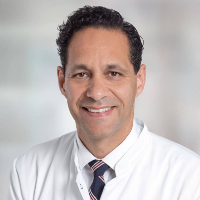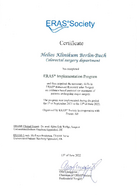Liver Cancer — Unilateral Hepatectomy: treatment in the Best Hospitals in the World
Treatment prices are regulated by national law of the corresponding countries, but can also include additional hospital coefficients. In order to receive the individual cost calculation, please send us the request and medical records.

Department of General, Abdominal Surgery and Surgical Oncology
The Department of General, Abdominal Surgery and Surgical Oncology offers the full range of services in these medical fields. Whenever possible, operations are performed using minimally invasive techniques, which are the gold standard of modern surgery. The outstanding quality of medical care is confirmed by numerous prestigious certificates, including certificates from the German Cancer Society, the German Hernia Society, etc. In addition, the department provides innovative hyperthermic intraperitoneal chemotherapy (HIPEC), which is available only in the most progressive clinics in Europe.







Department of General and Abdominal Surgery, Colorectal Surgery, Hepatopancreatobiliary Surgery, Hernia Surgery and Bariatric Surgery
The Department of General and Abdominal Surgery, Colorectal Surgery, Hepatopancreatobiliary Surgery, Hernia Surgery and Bariatric Surgery provides the full range of surgical treatment in its field of competence. The department's highly qualified surgeons annually perform about 2,000 surgical interventions. Extensive clinical experience allows the specialists to perform even particularly complex operations. The department’s advanced operating rooms serve for surgery to treat gastrointestinal diseases, liver, gallbladder, bile duct, pancreatic, rectal, anal and colon pathologies. The medical facility also successfully performs operations to treat hernias: inguinal, umbilical, and anterior abdominal wall hernias. In addition, the department's doctors deal with the surgical treatment of morbid obesity. Minor traumatic laparoscopic interventions are considered the gold standard, which guarantee a patient minimal risks and rapid postoperative restoration. Surgeons tell the patient in detail about their upcoming treatment and, in every possible way, support them in their recovery.







Department of General and Abdominal Surgery, Colorectal Surgery, Endocrine Surgery and Hernia Surgery
The Department of General and Abdominal Surgery, Colorectal Surgery, Endocrine Surgery and Hernia Surgery offers the full range of modern surgical interventions in the areas of its specialization. Every year, the medical facility performs more than 2,500 surgical interventions on an inpatient and outpatient basis. The department has vast clinical experience in the field of minimally invasive surgery, which allows the patient to avoid severe pain and prolonged hospitalization. In addition, the department offers robotic surgery using the most modern models of the da Vinci surgical system. The medical facility has the status of the Reference Center for Minimally Invasive Surgery and Hernia Surgery. Surgical treatment of cancer is one of the department's clinical priority focuses. A large number of da Vinci robot-assisted interventions are performed here for gastrointestinal cancers. The department holds a leading position in the use of the da Vinci surgical system in the treatment of rectal and sigmoid cancer patients. The operating rooms of the medical facility are equipped with the very latest technology, while hygiene and safety standards are at the highest level as well. Prior to surgery, the patient undergoes a comprehensive examination. Doctors also assess the risks of the upcoming operation and its expected results. With appropriate clinical indications, preference is always given to minimally invasive surgery.






Hemihepatectomy (unilateral hepatectomy) is an operation to remove the right or left lobe of the liver. It is a common operation for hepatocellular carcinoma. This surgical procedure can be performed for large and multiple tumors, but with sufficient functional reserve of the remaining part of the liver.
Large blood vessel invasion and lymph node involvement are not considered contraindications for this surgery. If the surgery is performed by experienced specialists, a patient has a good chance of recovery or long-term remission, even with large and multiple liver tumors.
You can take advantage of having a hemihepatectomy with good results and a low risk of cancer recurrence at one of the top hospitals in Europe. You are welcome to use the Booking Health website to find the most suitable medical center for you.
Content
- What is a unilateral hepatectomy for treating liver cancer?
- How is the operation performed?
- Why should you undergo your treatment abroad?
What is a unilateral hepatectomy for treating liver cancer?
The liver consists of two lobes: the right and left ones. Removing one of them is a common option for surgical liver cancer treatment. This type of surgery is called a liver lobectomy or a unilateral hepatectomy. It is most often done on the right side, but it can also be done on the left side.
Right/left hepatectomy can be simple or extended. An extended version of the operation involves the additional removal of other organs, complete or partial. Such operations are performed for patients with tumors spreading to adjacent organs, blood vessels, and lymph nodes, as well as due to portal hypertension and portal vein thrombosis.
How is the operation performed?
Hepatectomy surgery is performed under general anesthesia. In most cases, it is done through a large abdominal incision. Only a few German clinics use a laparoscopic approach, but a laparoscopic hemihepatectomy is a rare and complex surgery.
When performing the surgical intervention, the doctor makes an incision under the ribs, isolates the hepatic artery and portal vein, and blocks the branches of these blood vessels with clamps. The liver tissue is then cut off, hemostasis (stopping bleeding) and cholestasis (stopping the flow of bile from the damaged ducts) are performed with the help of clamps, electrocoagulation, and fibrin glue. The removed part of the liver is taken out of the abdominal cavity and the wound is sutured.
Laparoscopic surgery is done in the same way, but through shorter incisions. One larger incision is made to extract the removed liver fragment. Laparoscopic hemihepatectomy, either right- or left-sided, is technically feasible but may be extremely challenging. Studies show success rates comparable to open surgery, but good outcomes with a low risk of complications associated with minimally invasive liver tumor surgery are only possible in selected specialized centers.
Only a few specialists in Europe perform such operations. Their advantages are less blood loss, less postoperative discomfort, and a shorter hospital stay. Disadvantages include low availability (laparoscopic hemihepatectomy can only be performed in the world's best hospitals) and higher average cost of treatment for liver cancer.
Why should you undergo your treatment abroad?
You should go to one of the foreign clinics for liver cancer treatment. Treatment at the world's best medical centers is more effective and safer. The benefits of treatment abroad are as follows:
- Accurate diagnosis to choose the best surgical tactics
- Highly experienced surgeons
- Opportunity to perform not only open but also laparoscopic hemihepatectomy
- Low risk of complications
- Good postoperative care
- Good oncological outcomes with high long-term patient survival rates
Following successful surgery, many patients are cured of their cancer. Even if the tumor recurs, the recurrence-free period after a hemihepatectomy can be as long as 3-7 years or more.
You can select a clinic and make your treatment appointment at one of the foreign medical centers via the Booking Health website. The website offers prices for medical care programs. We will help you find the most suitable hospital and get medical care on your preferred dates. The specialists at Booking Health will be happy to advise you on all issues and organize your trip.
Authors:
The article was edited by medical experts, board certified doctors Dr. Nadezhda Ivanisova and Dr. Vadim Zhiliuk. For the treatment of the conditions referred to in the article, you must consult a doctor; the information in the article is not intended for self-medication!
Our editorial policy, which details our commitment to accuracy and transparency, is available here. Click this link to review our policies.
Sources:

